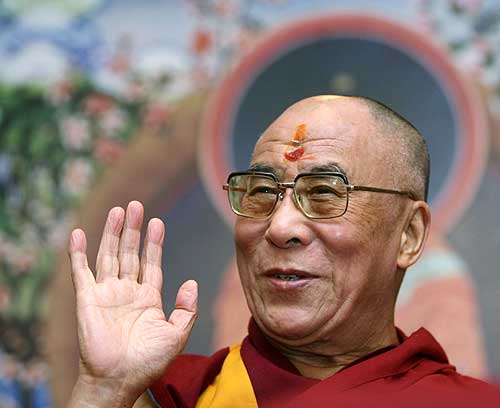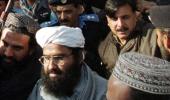 Significantly, reveals Rajeev Sharma, the MEA was not even consulted on the Dolkun Isa issue.
Significantly, reveals Rajeev Sharma, the MEA was not even consulted on the Dolkun Isa issue.
The hashtag #ModiBowsToChina started trending on Twitter from Monday afternoon hours after the world discovered the Narendra Modi government's embarrassing u-turn cancelling the visa to Uyghur leader Dolkun Isa, left.
By early Monday evening, it became the top trending item and over 23,000 tweets showing the groundswell of people's anger at the way the Modi government had kow-towed to China.
A government led by the leader who as the Bharatiya Janata Party's prime ministerial candidate had hauled the then United Progressive Alliance government over the coals on its China policy and had said the only way to deal with China was to show 'red eyes' to the Chinese!
The Modi government has shot itself in the foot by its u-turn over the Isa visa issue.
A key government official told me on Monday afternoon that the entire Isa Saga was the baby of Intelligence Bureau Director Dineshwar Sharma, National Security Advisor Ajit Doval's blue-eyed boy.
Significantly, the ministry of external affairs was not even consulted. This is as bizarre as bizarre can be.
What had started with a bang when last week the Modi government had taken on China in an unprecedented manner by playing the Uyghur card has now ended with a whimper with the Modi government finally ending up eating crow!
Clearly, the Chinese have pressured the Modi government as is evident by Isa's statement the full text of which is given below:
'As the Executive Committee Chairman of the World Uyghur Congress, I express my disappointment on Indian authorities' cancellation of my visa to attend the annual Interethnic Interfaith Leadership Conference taking place in Dharamsala, India, from April 30 to May 1.'
'This conference remains a vital forum through which ethnic and religious communities in China related areas, as well as statesmen, scholars and activists are able to meet openly to discuss and exchange ideas, promote peaceful dialogue, and reinforce bonds between disparate communities.'
'India had granted me a tourist e-visa, but it was cancelled after my visit was widely reported in the Indian press. Following numerous reports, Indian authorities then proceeded to rescind the visa on April 23. I recognise and understand the difficult position that the Indian government found itself, and regrets (sic) that my trip has generated such unwarranted controversy.'
'This is not the first time that I have had faced difficulties in my international travels to advocate Uyghur rights. In September 2009, I was detained briefly and denied entry to South Korea while travelling to attend the World Forum for Democratisation in Asia, to which I was an invited guest. China also has regularly attempted to block or interfere with my human rights work at the UN in Geneva, in particular.'
'I also reject any comparison or association to China's recent veto by the UN Security Council Sanctions Committee of Pakistani militant leader, Mazood Azhar.'
'Such an unjustifiable comparison seeks only to delegitimise my decades of impassioned work as a strictly non-violent campaigner for Uyghur rights. China's clear abuse of Interpol's Red Notice issuance is also concerning.'
'Historically speaking, the Uyghur community has maintained friendly ties with the Indian people. The Indian government hosted our late leader Isa Yusuf Alptekin and Uyghur refugees after they fled China in 1949.'
'Finally, I would like to thank the Indian people for their determined solidarity and commitment to rights activists like myself who wish to continue to develop and support dialogue among peoples of all faiths and ethnic backgrounds. I remain disappointed with the final decision, but I am hopeful that positive steps may be taken to maintain India's relationship with the Uyghur community.'
'I therefore wish the conference success and hope that meaningful dialogue will take place between those who have the privileged of participating the upcoming conference.'
After the Pakistani Joint Investigation Team episode -- when an Inter Services Intelligence officer was allowed to visit the terror-hit Pathankot airbase -- this is the second time in a month when a key foreign policy move by the Modi government has triggered controversy and evoked public condemnation, if one goes by the reactions on social media.
The twin episodes signify that the Modi government is losing the plot and quickly losing the perception war.
In the Dolkun Isa case, the issuance of a visa defied logic in the first place as it came when Defence Minister Manohar Parrikar and Doval were in China and engaged in serious discussions with their Chinese interlocutors.
Even if one were to agree that ministry of home affairs officials erred in not realising that Interpol had issued a red corner notice against Dolkun Isa as China maintained, the Modi government could have still saved itself eventual embarrassment by making a u-turn on the Isa visa issue. This u-turn could have been avoided without provoking the Chinese.
The best course for the Modi government would have been to allow Uyghur leaders, including Dolkun Isa, to travel to India to attend the inter-ethnic conference in Dharamsala and projecting their trip purely as a personal visit to pay obeisance to the Dalai Lama as all of them venerate the Tibetan spiritual leader.
Further, the Uyghur leaders should have been told not to make any political statements. Obviously, the Uyghur leaders would not have been allowed to meet any Indian ministers or officials.
This way, India would have still sent China a strong message. The Indian case to the Chinese would have been this: India is a democracy which respects individual freedom; and yet the Indian government has ensured that the Uyghurs don't make any political statements or indulge in any political activity.
In fact, the MEA had prepared itself for this kind of scenario, but it was kept out of the loop.
This controversy will dog the Modi government for a long time.
Rajeev Sharma is an independent journalist and strategic analyst who tweets @Kishkindha










 © 2025
© 2025